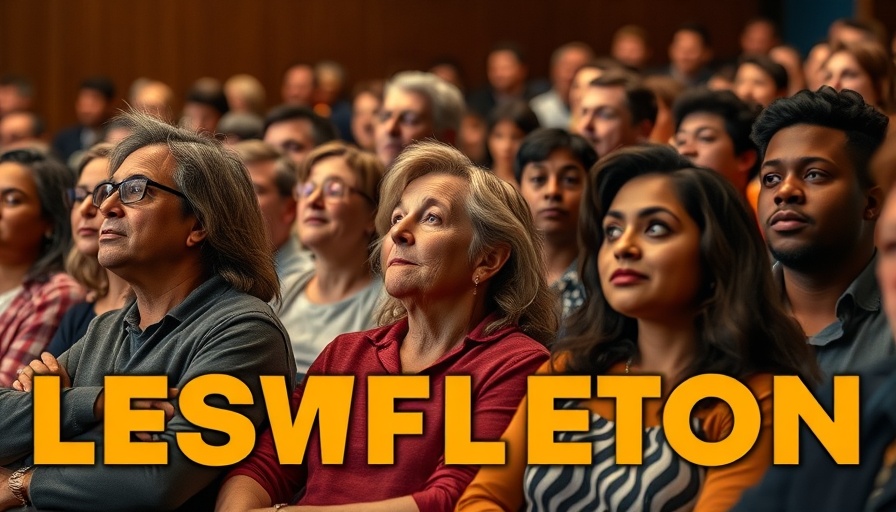
The Truth About Police and Race: Unpacking the Narrative
In the recent video titled PISSED OFF Black Professor Is Tired Of “Anti-White” Racist Lies, Columbia University English professor John McWhorter offers a pointed critique of current discussions surrounding race in America. He emphasizes a disconnection between public perception and the realities of racial violence, particularly how narratives often focus disproportionately on police violence against Black individuals while neglecting the broader issues affecting Black communities.
In PISSED OFF Black Professor Is Tired Of “Anti-White” Racist Lies, the discussion dives into critical issues surrounding race and policing, exploring key insights that sparked deeper analysis on our end.
Rethinking Anti-Racism: A New Perspective
McWhorter’s argument raises a crucial question: what does modern anti-racism achieve? While combating racism is universally acknowledged as urgent and necessary, contemporary anti-racist movements often miss the mark. In focusing intensively on police killings of Black individuals, these movements may inadvertently downplay the violence that occurs within communities themselves. For example, in 2021, over 10,000 Black individuals were murdered, predominantly at the hands of other Black individuals. This reality starkly contrasts with the six unarmed Black men who were killed by police that same year, illustrating a significant skew in public discourse.
Media Coverage and Its Discontents
The media's role in perpetuating these narratives cannot be overlooked. McWhorter argues that the disproportionate coverage of police shootings involving Black victims creates a misleading impression of the prevalence of racial biases within law enforcement. By focusing almost exclusively on these cases, the media fosters an environment where the broader epidemic of violence, especially in urban Black communities, receives little attention. This gap fuels misconceptions and distracts from potential solutions.
A Call for Honest Conversation
Engaging in open and honest conversations about race and violence is essential for progress. McWhorter’s assertion that discussions about race are often stifled by a narrative that emphasizes police racism at the expense of broader issues is a challenge to all involved. It urges a reevaluation of how race relations are navigated in public discourse—encouraging acknowledgment of uncomfortable truths in order to foster real change.
Education and Racial Narratives: What Needs to Change?
The education system, according to McWhorter, often propagates a victimology narrative that focuses on racial struggles rather than solutions. This shift in educational priorities may lead to underperformance among students who are taught to see themselves primarily as victims of systemic oppression rather than agents of change. Instead of equipping students with the tools to excel academically and socially, schools risk cultivating a mindset that emphasizes grievances over productivity.
Understanding Racial Dynamics Through a Complex Lens
The complexities of racial relations in America require a nuanced understanding that goes beyond binary classifications of victim and oppressor. McWhorter’s insights challenge readers to think critically about the implications of viewing racism solely through the lens of police interactions. To address the real underlying issues affecting communities, it is vital to foster conversations that include all facets of violence and social issues.
Confronting Modern Anti-Racism: A Path Forward
Modern anti-racism, McWhorter argues, has taken on a religious fervor that can obscure its original intentions. By focusing excessively on personal guilt and psychological implications of race, there is a danger of neglecting actionable strategies that could lead to genuine improvements for those in marginalized communities. It is crucial to strike a balance between acknowledging racism's existence and implementing effective change.
A New Approach to Helping Communities
To genuinely uplift Black communities, discussions must address systemic challenges without falling into the traps of oversimplified narratives. Practical initiatives that directly assist with education, economic opportunity, and community safety can provide a more comprehensive approach to dismantling the roots of violence and poverty.
Final Thoughts: Where to Go From Here?
Professor McWhorter’s perspective offers a wake-up call for anyone engrossed in the complexities of race and society. As we grapple with the issues of the present, it’s paramount that we allow for multifaceted discussions that explore the depth of the problems at hand. A renewed commitment to dialogue—grounded in compassion rather than division—can lead the way toward effective solutions that truly honor the value of every life.
 Add Row
Add Row  Add
Add 




 Add Row
Add Row  Add
Add 

Write A Comment